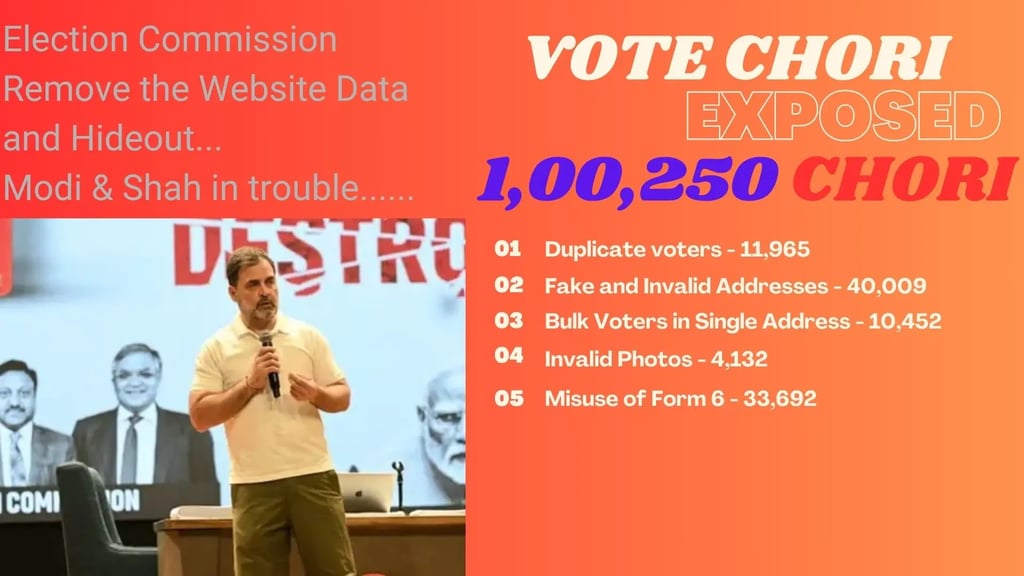UP Voter List Irregularities: Rahul Gandhi’s "Vote Chori' Exposé & Poll Panel Response
Rahul Gandhi’s "Vote Chori" exposé on UP voter list irregularities raises questions on poll panel response and voter fraud in India. and political fallout ahead of upcoming elections.


Several Irregularities in UP Poll Panel Chief’s Response to Rahul Gandhi’s Voter List Anomaly Exposé
Introduction
The electoral process is the cornerstone of any democracy. Recent allegations by Congress leader Rahul Gandhi about irregularities in the voter list have heightened tensions across political lines, especially with the UP Chief Electoral Officer (CEO)’s contradicted rebuttal. This article dives deeply into the contrasting claims, fact-checking, implications, and ramifications—expected to resonate well across trending news cycles both in India and abroad.
Background: What Did Rahul Gandhi Expose?
On August 7, 2025, Rahul Gandhi held a press conference alleging serious manipulation in voter rolls from Karnataka to UP, Maharashtra, and Haryana. He used electoral data screenshots (dated March 16, 2025) to claim that certain individuals, including Aditya Srivastava (EPIC: FPP6437040) and Vishal Singh (EPIC: INB2722288), were listed as voters in multiple assembly constituencies—such as Bengaluru’s Mahadevapura, Mumbai’s Jogeshwari East, and UP’s Lucknow East and Varanasi Cantt The Wire, The New Indian Express.
Additionally, he highlighted over 1 lakh instances of “vote theft” in Bengaluru’s Mahadevapura assembly segment, citing:
11,965 duplicate voters
40,009 fake/invalid addresses
10,452 bulk voters
4,132 invalid photos
33,692 Form-6 manipulations
He also cited a case of 70-year-old Shakun Rani registered twice within two months Outlook India The Wire.
UP CEO’s Response: A Rebuttal—or a Misfire?
The UP Chief Electoral Officer (Navdeep Rinwa) issued a statement rejecting the claims, clarifying that Aditya Srivastava and Vishal Singh were only enrolled in Karnataka's Mahadevapura constituency, with no presence in Lucknow or Varanasi lists The New Indian Express The Times of India.
Yet, an investigation by The Wire revealed that Rahul Gandhi’s allegations were based on draft and final voter rolls—published in October 2024 and January 2025—which indeed contained those names in UP constituencies The Wire. Moreover, SHOCKINGLY, details like father’s names and EPIC numbers had changed, undermining the credibility of the UP CEO’s rebuttal.
Broader Political Backlash and Institutional Responses
Election Commission of India (ECI)
Labeled Rahul Gandhi’s accusations as "sensational" and demanded he file a signed affidavit or issue an apology India Today The Times of India.
Noted that Karnataka uses the same electoral rolls for state functions like the caste census, reinforcing their legitimacy The Times of India.
The Karnataka CEO issued a notice asking for proof of alleged double voting by Shakun Rani The Economic Times.
Political Reactions
Kamal Nath (MP) recalled a similar voter-roll scandal in 2018. He said ECI acknowledged deleting 24 lakh suspicious entries, including duplicates and invalid entries—but also criticized the lack of public, machine-friendly data The Times of India.
Abhishek Singhvi raised red flags over the timing of the Special Intensive Revision (SIR) in Bihar, suggesting voters removed close to polls had limited recourse The Times of India.
Devendra Fadnavis, Maharashtra CM, dismissed Rahul’s claims as politically staged and theatrically akin to a Bollywood script The Times of India+1.
Analysis: What’s Going On?
1. Timing & Format of Voter Rolls
Rahul’s exposé used the March 2025 snapshot, while the UP CEO referred to August 2025 data. Discrepancies may be due to roll updates—but they also raise questions of transparency and consistency.
2. Data Accessibility & Verification Challenges
Rahul accused the ECI of deliberately using non-machine-readable formats, complicating investigations. It allegedly took six months to analyze the data properly The Wire Outlook India.
3. Political Messaging vs. Institutional Integrity
Both sides have political motives. Rahul’s launch of the “Vote Chori” website amplifies his campaign, while the ECI and ruling coalition attempt to affirm institutional credibility The Times of India Reuters.
4. Precedents & Double Standards
The 2018 voter-roll controversy in Madhya Pradesh serves as both a precedent and reflection of lingering issues. The lack of open, machine-readable voter data continues to hinder both transparency and trust The Times of India.
Impact & Why This Trend Matters
Public Trust in Elections
Any significant irregularity—perceived or real—in the electoral system threatens democratic institutions. This debate has reignited concerns over voter suppression, rigged lists, and systemic fairness.
Voter Awareness & Mobilization
Rahul’s Vote Chori initiative has energized a wider audience, encouraging citizens to demand transparency and digital access to voter data. Public sentiment is growing, making this a sustained trending topic.
Pre-Election Politicking Ahead
With Bihar, West Bengal, and other key elections looming, both ECI and political parties understand the stakes. The narrative of electoral mistrust can influence campaign strategies and voter turnout.
Concluding Thoughts
The UP poll panel chief’s dismissal of Rahul Gandhi’s voter list exposé appears riddled with inconsistencies—both factual and procedural. While voter roll irregularities are not unprecedented, this episode exposes deeper challenges: data accessibility, accountability, and institutional credibility.
Moving forward, the demand for machine-readable electoral rolls, public scrutiny, and judicial oversight is becoming more pronounced. India’s democracy might rely on how effectively these reforms are pursued before the next election cycle.
